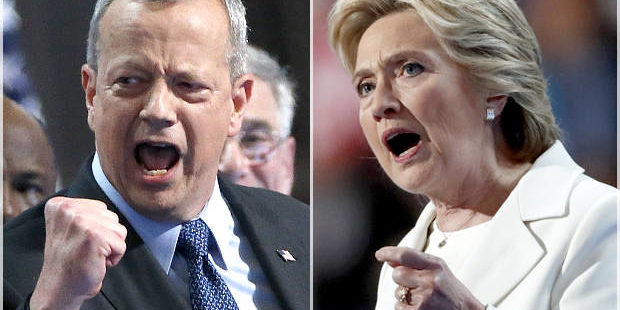
Clinton, Gen. Allen and alarmist declarations: The media must call out leaders for their dangerous fictions
A couple of remarkable things got said on television last Sunday morning. Both seemed to have slipped into the record without much comment. Let us keep the record straight, then — the never-ending task when you have a corporatized press dedicated to dishonesty.
John Allen, a retired Marine general, addressing the prospect of a Trump presidency on ABC’s “This Week“: “What we need to do is ensure that we don’t create an environment that puts us on a track conceivably where the United States military finds itself in a civil-military crisis with a commander-in-chief who would have us do illegal things. That’s a major issue that we’re facing here, the potential for a civil-military crisis where the military could be ordered to conduct illegal activities.”
Hillary Clinton on Fox News, remarking on the Democratic National Committee’s email mess: “We know that Russian intelligence services hacked into the DNC and we know that they arranged for a lot of those emails to be released, and we know that Donald Trump has shown a very troubling willingness to back up Putin, to support Putin.”
I could hardly wait for Monday’s papers to see how they would play these assertions. Nothing in any of them. The old rule applies once more: When people say remarkable things that are remarkable in the wrong way, they do not get remarked upon.
My remarks, one at a time:
*
Allen, as readers know, was among the military brass who breathed Clintonian fire at the Democratic convention. His comments on ABC were advanced as mere elaboration of anti-Trump animosity within the officer class (but not the rank-and-file). We have known for some time that Clinton is the Pentagon’s preferred candidate — for good reason, this — so there should be no cause for the American body politic to ripple with surprise. And it has not.
Emphatically there is cause. Emphatically we must take note.
Straight off the top, we have the spectacle of the American military assuming an active role in American politics. This is more than questionable: It is a grave step in the wrong direction. I wonder which is worse — if the army were to barge in, banana republic-style, or if a major political party welcomes it, as the Democrats just did.
If you think this is a hair-split, consider Allen’s comments on ABC and think again. “A civilian-military crisis” was his phrase, and he used it twice. In evident pursuit of absolute clarity, the general tacked on a truly chilling descriptive, “… a civilian-military crisis the likes of which we’ve not seen in this country before.”
And you thought Trump is the one who harbors an extra-constitutional authoritarian streak.
What is this man telling us? Maybe there is more than one way to interpret the general’s threat—and however one takes this a threat is what he leveled. In my read, a military officer just told us that a coup could ensue should the voting public deliver to the White House a candidate the Pentagon does not like.
A silent coup, a gentlemanly, unseen coup, Allen assured George Stephanopoulos, assuming this is what he meant: “My hope would be that the conversation would occur quietly in the Oval Office, or somewhere else, to advise him not to continue along this track.”
Lest this column come over as alarmist, I will add that we are in all likelihood many miles from any such eventuality as an outright coup. But words are actions, as the late Pierre Bourdieu argued persuasively in “Language and Symbolic Power.” And nowhere is this truer, he added, than in politics. However far we may be from a military rebellion against an elected official — and however far from Allen’s mind — he has now put the thought of one on the table. As these things go, we have just been advised that this is now a legitimate part of the conversation. Think of it this way: A Marine general has an American columnist writing about whether a military officer just threatened a coup. There is nothing good in this.
Four conclusions.
One, Allen skips a modest step — commonly called democratic process. Were Donald Trump, as commander-in-chief, to order a new campaign of torture — as against all the American army’s previous campaigns of torture — legality would be determined by the other two branches of government. Read and recite your Kipling, general: Yours is to do or die, nothing more. Your task is operational and never involves political levers. Maybe you, Sir, should read the constitution.
Two, the thought that a Marine general would bridle at illegal conduct of any kind is not laughable — the history of the military’s conduct being too shameful — but it is ridiculous. The Pentagon’s true objection to Trump is that he does not belong to the right clubs. Trump has no ties to the armed services and the defense industry. He does not understand the necessity of confrontational foreign policies to keep the Juggernaut rolling. Clinton has such ties and understands well.

